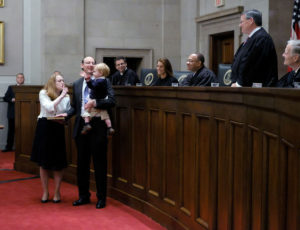 I attended yesterday the official swearing-in of a new judge on the Virginia Supreme Court, Steve McCullough. The process was an interesting example of a powerful “speech act” (an utterance that causes something to happen), namely having the Chief Justice of the Supreme Court transform an ordinary citizen into a fellow Supreme Court Justice by a few simple words spoken as an oath of office. The magical transformation only happens, however, if the oath is spoken correctly. President Obama in 2009 had to retake later the oath of office because Chief Justice John Roberts did not prompt him with the exact correct language, so that Obama did not say the line correctly. It’s not likely in that particular case that anyone would question whether Obama was really the President of the United States (although, given the birther controversy, that may have happened, if he had not retaken the oath). In the case of marriage vows, a similar transformational speech act, the absence of the concluding statement, “I now pronounce you husband and wife” often is played up in fiction and film as meaning that the couple is in fact not legally wed (i.e., The Graduate, The Princess Bride).
I attended yesterday the official swearing-in of a new judge on the Virginia Supreme Court, Steve McCullough. The process was an interesting example of a powerful “speech act” (an utterance that causes something to happen), namely having the Chief Justice of the Supreme Court transform an ordinary citizen into a fellow Supreme Court Justice by a few simple words spoken as an oath of office. The magical transformation only happens, however, if the oath is spoken correctly. President Obama in 2009 had to retake later the oath of office because Chief Justice John Roberts did not prompt him with the exact correct language, so that Obama did not say the line correctly. It’s not likely in that particular case that anyone would question whether Obama was really the President of the United States (although, given the birther controversy, that may have happened, if he had not retaken the oath). In the case of marriage vows, a similar transformational speech act, the absence of the concluding statement, “I now pronounce you husband and wife” often is played up in fiction and film as meaning that the couple is in fact not legally wed (i.e., The Graduate, The Princess Bride).
The oath of office actually was made interesting by the fact that the new Justice held his 2-year son, Andrew, as the oath was being administered, while Andrew’s mother held the bible on which Steve swore the oath (and tried to quiet down her son). Speech acts may be accompanied by such nonverbal signals as the presence of an official document of some sort or the wearing of prescribed clothing, as, in this case, the black robes, which visually transformed Steve from a citizen into a Justice (the “robing” was also done ceremoniously). Part of this official act was also that it took place in a prescribed location, namely the Chambers of the Virginia Supreme Court, a place set apart from normal everyday life (no cell phones allowed, sitting and standing at prescribed times, always beginning one’s addressing of the Justices with the formula, “may it please the court”). In linguistics, we would say that the “felicity conditions” (i.e., in this instance, all the outer trappings) for this “commissive” speech act (it commits Steve to fulfilling the oath of office) have been fulfilled.
Into this august environment came Andrew, who chimed in merrily while his father took the oath. It struck me at the time that the kind of informality represented by having a new Supreme Court Justice hold a babbling 2-year old during such an important official government ceremony, in the presence not only of the other Justices, but also of the Governor of Virginia, members of the Virginia legislature, and other high officials, was something that might not be done in all cultures. In the US, we like to see our government officials as being no different from ourselves, often choosing a political candidate by the fact that he’s “just like us” (open question of how well that works out). Being a doting father is part of that image projection and having children close by in such instances is both accepted and valued. When you’re the US President on an official visit to Vietnam, having noodles and cold beer at a neighborhood joint in Hanoi is just the kind of “ordinary joe” behavior we like to see.
I don’t usually hobnob with the Governor and the Supreme Court, but Steve is a former VCU student, whom I hired as a lab assistant back in the early 1990’s when I ran the Language Lab. After graduating from law school, he worked for a while for my wife’s law firm, so we’ve known Steve and his family for a long time. It’s great to see a former student have this degree of success. I asked Steve after the ceremony whether he figures that being a Supreme Court Justice will be an interesting line of work. He answered that there are likely to be engrossing cases that come up, but that a lot of it will be routine and less than exciting – just like all jobs.